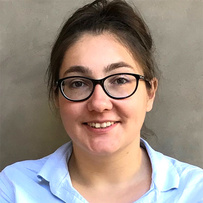
3:00 pm to 4:00 pm
GHC 6501
Abstract: The prevalence of smartphones and wearable devices for health monitoring and widespread use of electronic health records have led to a surge in heterogeneous multimodal healthcare data, collected at an unprecedented scale. My research focuses on developing machine learning techniques that learn salient representations of multimodal, heterogeneous data for biomedical predictive models. The first part of the talk describes the construction of hybrid models that combine deep learning with random forests, and the fusing of structured information into temporal representation learning. These methods obviate the need for feature engineering while improving on the state of the art for diverse biomedical applications. Use cases include the prediction of surgical outcomes for children with cerebral palsy, and forecasting the progression of osteoarthritis from subjects’ physical activity.The focus of the latter part is on hybrid methods for the integration of images and multi-resolution, irregular time series data for disease trajectory modeling, developed with my students at UMass Amherst. Multi-FIT, a unified model for the construction of flexible temporal representations, is designed to handle missing values and irregularly collected samples in multi-resolution, multivariate time series. Multi-FIT outperforms the state-of-the-art for patient survival prediction on the Physio Net Challenge 2012 ICU data. FLAReis a model that provides more informative modeling of the temporal relationships between patients’ history and the disease trajectory by generating a sequence of latent representations of patients’ health status across the time horizon. FLARe improves on the state-of-the-art on forecasting the progression of Alzheimer’s disease from brain MRIs and contextual information from the ADNI dataset.
Bio: Ina Fiterau is an Assistant Professor in the College of Information and Computer Sciences at UMass Amherst. She has completed a PhD in Machine Learning from Carnegie Mellon University (Fall 2015), and a Postdoc at Stanford University (Fall 2018). Ina is currently expanding her research on interpretable models, in part by applying deep learning to obtain salient representations from biomedical unstructured data, including time series, text and images. She is the recipient of the Marr Prize for Best Paper at ICCV 2015 and of Star Research Award at the Annual Congress of the Society of Critical Care Medicine 2016. Madalina has co-organized the Neur IPS workshop on Machine Learning in Healthcare.
Homepage: https://www.cics.umass.edu/people/fiterau-brostean-madalina
